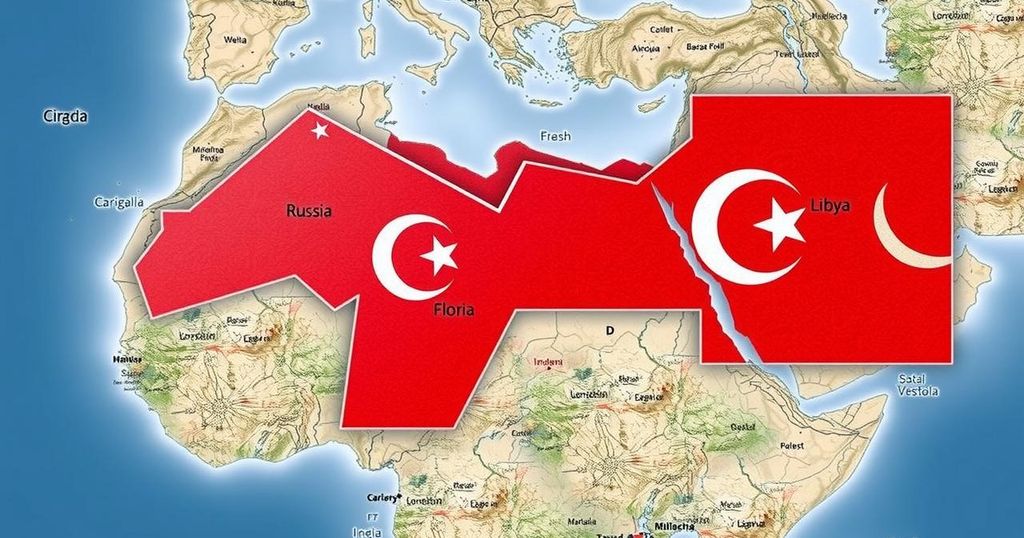World news
AFP, AFRICA, AHMED AL - SHARAA, ARMS TRADE, ASIA, ATLANTIC, BASHAR AL - ASSAD, BELARUS, CENTRAL AFRICAN REPUBLIC, CONFLICT RESOLUTION, EUROPE, EUROPE/ASIA, EYES ON WAGNER, GOVERNMENT OF NATIONAL UNITY, JA, KHALIFA HAFTAR, KR, KREMLIN, LIBYA, MEDITERRANEAN, MIDDLE EAST, MILITARY, MOROCCO, MOSCOW, NORTH AMERICA, RUSI, RUSI THINK TANK, RUSSIA, RUSSIA-UKRAINE WAR, SAHARAN AFRICA, SAHEL, SPARTA, SUDAN, SYRIA, SYRIAN, TO, TOBRUK, TURKEY, UK, UNITED STATES, WAGNER, WAR
David O'Sullivan
0 Comments
Russia Shifts Focus to Libya as New Strategic Outpost After Assad’s Fall
The article discusses Russia’s strategic shift from Syria to Libya following the fall of Assad, as Moscow seeks to secure its influence in Africa. With significant military resources being redirected to support Khalifa Haftar, challenges arise due to Libya’s complex political landscape and external opposition, indicating that Russia may face difficulties in establishing a comparable foothold to that in Syria.
The upheaval following the fall of Bashar al-Assad in Syria has compelled the Kremlin to pivot its focus towards Libya as a strategic alternative for projecting power in Africa and the Mediterranean region. Russia historically has maintained a military presence in Syria, utilizing air bases and ports for operations extending to North Africa. However, with leadership changes in Syria, Russia is seeking to solidify its influence in Libya, where it already supports the Eastern Libyan leader, Khalifa Haftar, amid ongoing tensions with the Tripoli-based Government of National Unity (GNU).
Significant shifts in Russian military activities have been noted since Assad’s departure, with a notable increase in resources transported to Libya, including advanced radar and missile systems. Russian mercenaries are actively involved under Haftar’s command, marking a strategic transition as Russia seeks to preserve its operational capabilities within Africa. This move is perceived not merely as a replacement of proxies but as an essential strategy to maintain influence amidst the geopolitical turmoil created by Assad’s exit.
Analysts argue that Haftar’s position offers Russia a means to challenge Western interests while exploiting Libya’s fragmented political landscape. Nonetheless, Russia’s ambitions may face significant hurdles in Libya, which presents a more complex and visible battleground than the relatively isolated Syria. The presence of competing international powers and the need for discretion highlight the difficulties Moscow may encounter in establishing a strong foothold in Libya comparable to that of Syria. Furthermore, local dynamics suggest that Haftar may be reluctant to fully align with Russian support, maintaining connections with Western nations.
The background of this article revolves around the shifts in Russian foreign policy following the political changes in Syria. The historical alliance between Russia and Assad facilitated Moscow’s operations in the Mediterranean, which included military bases and ports. Following Assad’s fall, the Kremlin now considers Libya as an alternative for securing its strategic interests in Africa. The presence of Russian mercenaries and the transfer of advanced military equipment to Libya signify a new phase in Russia’s geopolitical maneuvering, aiming to influence a region that has been volatile since the ousting of Muammar Gaddafi in 2011.
In summary, the article illustrates how the fall of Bashar al-Assad has prompted Russia to explore new avenues for influence in North Africa, particularly through engagement in Libya. With the ongoing support for Khalifa Haftar, Moscow aims to maintain its strategic presence in a region rife with geopolitical complexities. However, the challenges presented by both local dynamics and external powers may inhibit Russia’s ability to consolidate its influence as it did in Syria.
Original Source: thedefensepost.com




Post Comment